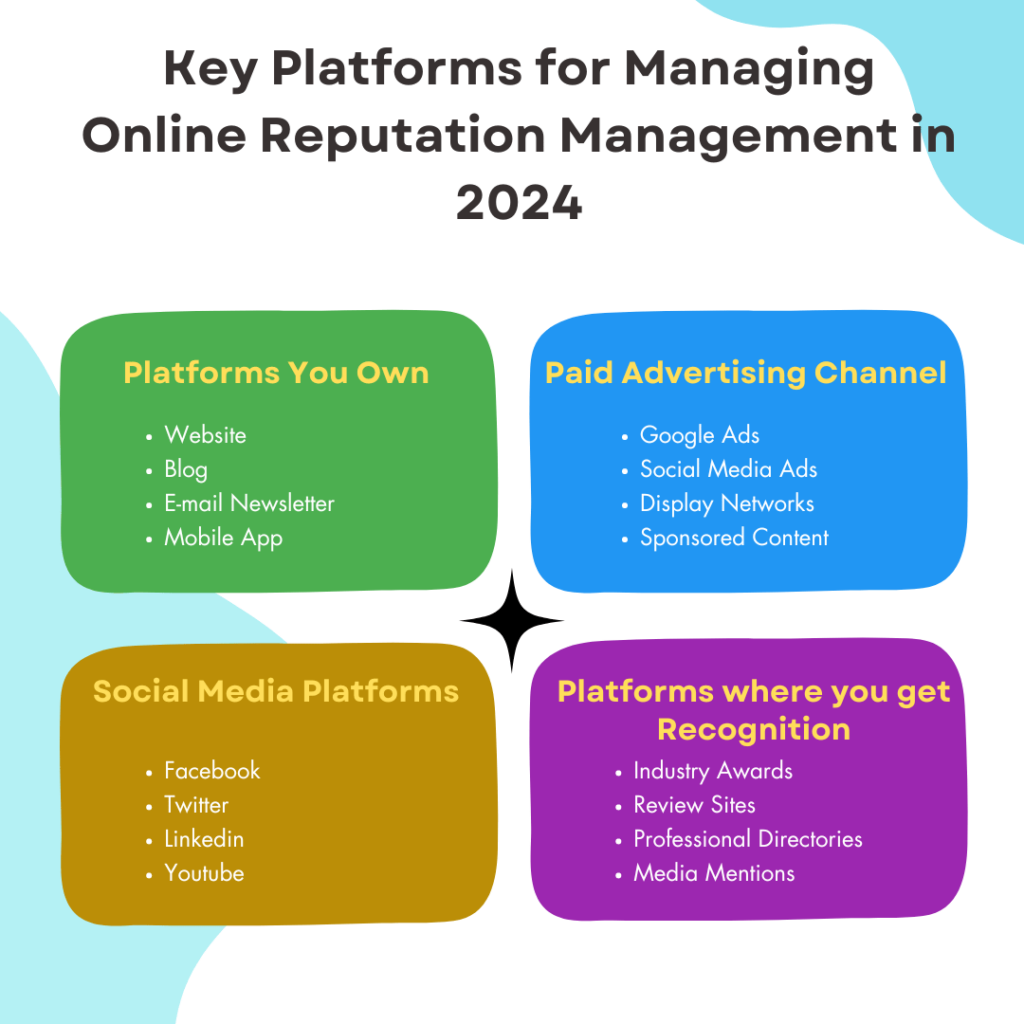As we step into 2024, online reputation management is more crucial than ever. With the rise of social media and instant reviews, our digital presence shapes how others see us. In recent years, businesses and individuals have faced challenges in maintaining a positive image online. Negative comments can spread like wildfire, impacting trust and credibility.
We need to stay proactive in managing our online reputation. This means monitoring feedback, addressing issues quickly, and showcasing our strengths. By understanding the trends of 2024, we can build a robust strategy that enhances our brand image and fosters community trust. Together, we can navigate this evolving landscape effectively.
Key Takeaways
- Start monitoring your online presence regularly to identify areas that need improvement.
- Engage with customers by responding to reviews and feedback promptly, showing that you value their opinions.
- Use social media platforms effectively to promote positive content about your brand and address any negative comments.
- Implement a proactive strategy for content creation, focusing on blogs and articles that highlight your expertise and values.
- Utilize reputation management tools to track mentions of your brand and analyze public sentiment.
- Stay updated on trends in online reputation management, as strategies may evolve throughout 2024.
Boost Your Online Reputation Today!
Understanding Online Reputation Management in 2024
Online reputation management (ORM) is crucial in today’s digital world. It involves monitoring and influencing our online presence. We shape how others perceive us based on what they find online. ORM helps protect our image and builds trust with customers.
The importance of ORM cannot be overstated. In 2024, businesses rely heavily on their online reputation to attract and retain customers. A positive reputation can lead to increased sales and loyalty. Conversely, a negative reputation can drive potential customers away. We must actively manage our online image to stay competitive.
Several key components contribute to a positive online reputation. First, we need to monitor reviews on platforms like Google, Yelp, and social media. Regularly checking these sites allows us to respond promptly to feedback. This shows we value customer opinions.
Second, we should create quality content that reflects our brand values. Engaging blog posts, videos, and social media updates help us connect with our audience. By sharing valuable information, we build credibility and trust.
Third, engaging with our audience is essential. Responding to comments and messages creates a sense of community. It shows we care about our customers’ experiences and opinions.
Lastly, we must address negative feedback constructively. Ignoring or deleting bad reviews can worsen the situation. Instead, we should respond professionally and offer solutions when possible. This approach can turn a negative experience into a positive one.
Consumer behavior is heavily influenced by online reviews and perceptions. Research shows that 84% of people trust online reviews as much as personal recommendations. Positive reviews encourage potential customers to choose our services over competitors.
On the other hand, negative reviews can deter them from purchasing decisions. Many consumers read multiple reviews before deciding whether to engage with a business. They often look for patterns in feedback rather than relying on a single review.
We also notice trends in consumer behavior regarding social media influence. When friends or influencers share their experiences, it impacts our choices significantly. Peer recommendations often hold more weight than traditional advertising.
In summary, managing our online reputation is vital for success in 2024. By focusing on key components like monitoring reviews, creating quality content, engaging with our audience, and addressing feedback effectively, we can cultivate a positive image. Understanding how consumer behavior shifts based on online perceptions helps us tailor our strategies for better outcomes.
The Importance of Managing Your Online Reputation Management in 2024
Enhancing Online Presence
We need to utilize SEO strategies to improve our visibility on search engines. This helps us appear in relevant searches. By using keywords effectively, we can attract more visitors.
Content marketing plays a crucial role too. We should create engaging content that informs our audience. This not only builds interest but also positions us as experts in our field.
Optimizing our website and social media profiles is key for a cohesive brand image. Consistent branding across platforms helps us look professional. It makes it easier for customers to recognize us.
Building Trust with Your Audience
Establishing transparency is vital for authentic communication. We must be honest about our products and services. Sharing success stories and testimonials builds our credibility. Customers trust what others say about us.
Regular engagement with our audience fosters relationships and loyalty. Responding to comments and messages shows we care. This connection encourages customers to choose us over competitors.
Collecting Valuable Feedback
Implementing surveys and polls allows us to gather customer insights. These tools help us understand what our audience thinks. Encouraging open dialogue through social media channels creates a space for feedback.
Analyzing feedback is essential for identifying areas for improvement. We can learn what works and what doesn’t. This information drives innovation within our organization.
Handling Negative Situations
Developing a protocol for responding to negative reviews is critical. Quick responses show we value customer opinions. Maintaining professionalism and empathy in all communications is necessary.
Learning from criticism helps us enhance our products or services. Constructive feedback often leads to better offerings for our customers.
Driving Business Growth
Aligning our reputation management efforts with business objectives is important. Positive reviews can attract new customers while retaining existing ones. We should leverage these testimonials in our marketing efforts.
Monitoring industry trends keeps us adaptable. Staying informed allows us to adjust strategies for growth effectively.
Drawing in Top Talent
Showcasing our company culture and values on our platforms attracts potential hires. Highlighting employee testimonials gives insight into life at our company. This can draw in candidates who share similar values.
Promoting our commitment to diversity and inclusion appeals to a wider talent pool. It shows we are an organization that values different perspectives.
Worried About Your Online Image? Let’s Talk
Steps to Manage Your Company’s Online Reputation Management in 2024
Begin with a Reputation Audit
We start by assessing our current online presence. This means looking closely at what people say about us on various platforms. We identify our strengths and weaknesses through customer feedback and reviews. This audit creates a baseline for measuring future improvements in our reputation.
Develop a Comprehensive Strategy
Next, we outline clear goals for our online reputation management services efforts. These goals guide our actions and help us stay focused. Incorporating various tactics is crucial. We can use content creation, social media engagement, and public relations strategies. Assigning responsibilities to team members ensures accountability and effective execution.
Keep an Eye on Brand Mentions
We utilize monitoring tools to track mentions of our brand online. Tools like Google Alerts or social media dashboards help us stay informed. Responding to both positive and negative mentions shows that we are engaged with our audience. Analyzing trends in brand mentions helps us adjust our strategies accordingly.
Promote Customer Reviews
Encouraging satisfied customers to leave reviews is essential. We ask them to share their experiences on multiple platforms like Google, Yelp, or Facebook. Featuring positive reviews prominently on our website boosts credibility. Responding to reviews, whether good or bad, shows appreciation and encourages further feedback from others.
Be Ready for Crisis Management
Preparing a crisis communication plan is vital for potential reputation threats. We must train our team on handling negative publicity effectively. Establishing a rapid response team ensures that we can address issues as they arise. Being proactive reduces the impact of any crisis on our reputation.
Measure Your Progress
Setting specific KPIs helps us evaluate the effectiveness of our reputation management efforts. We regularly review analytics to track changes in public perception. Adjusting our strategies based on performance data and feedback keeps us aligned with our goals.
Key Platforms for Managing Online Reputation Management in 2024

Platforms You Own
We focus on optimizing our website and blog to convey our brand messaging clearly. Our website serves as the cornerstone of our online presence. We ensure it reflects our values and mission. This includes using consistent language, visuals, and tone throughout our content.
Email marketing is another vital tool we use. It allows us to communicate directly with our audience. By sending newsletters and updates, we keep our community informed and engaged. We also encourage feedback through these channels. This two-way communication helps us understand their needs better.
Paid Advertising Channels
Investing in targeted ads is essential for reaching specific demographics. These ads help enhance our visibility across various platforms. We can tailor messages to resonate with different audiences. This strategy increases the chances of engagement and conversion.
Retargeting strategies play a crucial role in our advertising efforts. They allow us to engage previous visitors who may have shown interest in our services. By reminding them of what we offer, we can encourage them to return and take action.
Analyzing ad performance is key to refining our approach. We track metrics such as clicks, conversions, and engagement rates. This data helps us maximize our return on investment (ROI) and adjust campaigns accordingly.
Social Media and Shared Platforms
Engaging actively on social media is vital for building community and brand loyalty. We consistently share updates, respond to comments, and participate in conversations. This interaction fosters a sense of belonging among our followers.
User-generated content enhances our authenticity and trustworthiness. We encourage our audience to share their experiences with our brand. By showcasing their stories, we create a more relatable image that resonates with potential customers.
Monitoring social media trends keeps us relevant. Staying connected with our audience means adapting to their preferences and interests over time. We leverage popular hashtags or challenges to engage effectively.
Platforms Where You Earn Recognition
Seeking opportunities for guest blogging expands our reach significantly. Collaborating with other brands or influencers allows us to tap into new audiences. We gain credibility when recognized by established voices in our industry.
Participating in industry awards boosts our reputation further. These recognitions validate our efforts and showcase our expertise. Winning or even being nominated can attract attention from potential clients.
Leveraging partnerships with influencers enhances visibility. Influencers can introduce us to their followers, broadening our audience base. Their endorsement also adds an extra layer of trust.
Schedule Your Free Consultation Today!
Case Study
In 2018, Facebook faced a major online reputation challenge after the Cambridge Analytica data scandal, where millions of users’ data was improperly accessed and used for political purposes. The backlash was immediate, with users, governments, and advertisers questioning Facebook’s data privacy practices. To regain trust, Facebook implemented stricter data privacy policies, launched public awareness campaigns, and CEO Mark Zuckerberg testified before Congress. This case shows how crucial online reputation management is, especially when addressing privacy concerns, and the importance of transparency in rebuilding trust with users.
Final Remarks
Managing our online reputation is crucial in 2024. We’ve seen how a strong presence on key platforms can shape perceptions and drive success. By understanding the importance of our digital footprint and taking actionable steps, we can protect our brand and build trust with our audience.
Let’s take charge of our online narrative together. Regularly monitor feedback, respond to reviews, and engage with our community. This proactive approach not only enhances our reputation but also fosters loyalty. Now’s the time to act—let’s make our online presence work for us!


